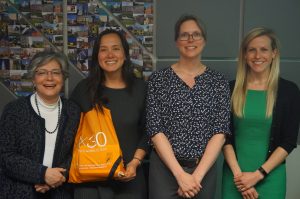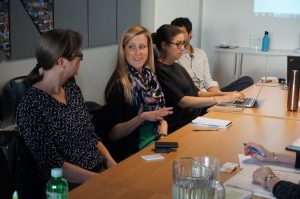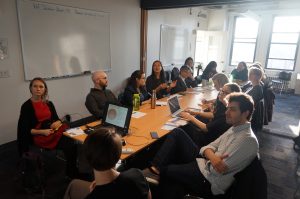May 22, 2017
By Megan Nordgren

Photo by Giulia Luci
On Tuesday, May 9, representatives from the public and private sectors in sustainable waste management came together with moderator Emily Taubenblatt to provide career insights into this rapidly growing and changing field. While the speakers described different experiences with their respective employers, they agreed on the kinds of traits that are most useful when working in the field of sustainable waste management: Patience, Persistence and the Ability to Troubleshoot.
Marisa Kaminski – NYC Department of Education Zero Waste Schools Program
With more than 1,800 public schools in New York City serving more than one million students, the Department of Education (DOE) has a very large waste footprint. To support OneNYC’s Goal of Zero Waste by 2030, the DOE Office of Sustainability created a new Zero Waste Schools Program to help schools improve their recycling rates and reduce their waste. The program is a partnership between the Department of Sanitation and GrowNYC’s Recycling Champions, working together to increase recycling.
With the program now in its first year, the seven current staff members who serve as Zero Waste Schools coordinators are working with 100 schools selected to be in the program. They also help other schools when requested, and assist schools identified as having a problem. The coordinators work with the various school staff involved in recycling, including custodians, school food staff, principals, teachers, and students to troubleshoot problems that are found and to provide education. Several of the coordinators have Master’s Degrees in Sustainability Management, but it is not a requirement for employment. What is required, however, are strong communications skills, project management skills, and the ability to troubleshoot.

Photo by Giulia Luci
The NYC Department of Sanitation (DSNY) is the world’s largest sanitation department. The Bureau of Recycling and Sustainability implements programs, provides outreach and education, creates print materials, holds trainings, and develops partnerships. With the citywide goal of Zero Waste to landfills by 2030, the Bureau of Recycling and Sustainability has a big job to increase recycling. One way this is being done is through expansion of the collection of organic materials, which makes up one-third of the city’s waste. Organics collection currently occurs in Staten Island, Brooklyn and Queens, as well as in high-density areas of the other boroughs, but the program is mandated to become citywide by the end of 2018.
To achieve the city’s goals, the Bureau is conducting personalized enrollment. One way to get buy-ins is to have the staff walk beside the collection trucks to educate residents, and then sign them up for this now-voluntary program. Additionally, they operate Community Compost sites throughout the city to educate residents by showing them the direct connection between food waste and soil. These sites also provide compost for community spaces, demonstrate composting, and serve as a local drop-off point for residents’ compost.
Marguerite has a background in math and started out in an analytical job, but soon found she wanted to follow her passion. She became a Master Composter and started volunteering until she found a full-time position. The most interesting part of her job is developing partnerships and finding ways to convince people to make changes that at first might seem inconvenient.

Photo by Giulia Luci
A waste and recycling technology company, Recycle Track Systems increases efficiency in the private waste hauling industry by providing real time data, connectivity, and accountability to its clients. Recycle Track Systems works with small and mid-size waste haulers to put the technology on their trucks. The technology improves transparency and increases efficiency in waste collection and disposal, and the company also provides on-site sustainability training and education for businesses.
The flow of waste is messy and requires a strong focus on logistics and problem solving, so data analysis and technology skills are needed in this industry. As the company works with the entire chain, the position requires an ability to communicate with a wide array of people. Prior to working with Recycle Track Systems, Amy received a degree in communications and conducted waste audits for a consulting firm. She maintains that it is a good time to be interested in sustainable waste management in New York City, as the field is expanding.

Photo by Giulia Luci
Since 1988, Jacquelyn Ottman has had a long and distinguished career in sustainable waste management. She started her career in marketing, but then decided to apply her skills in marketing and message development to the green sector, founding J. Ottman Consulting. Since then, she has advised ecolabels, worked with Fortune 500 sustainability leaders and written four books on green marketing. In 2013, she founded WeHatetoWaste.com, a site dedicated to preventing waste and conserving resources. Jacquelyn advised participants in the Green Careers program to focus on a career, rather than a job.
There are a wide variety of environmental jobs out there (lawyer, storyteller, scientist, advocate, marketer, etc.) so Jacquelyn emphasized the importance of zeroing in on what you want to be, and offered a lot of advice to Green Careerists. Your career should be the intersection of your skills, interests and passions, but also must be relevant to the moment. It is important to be prepared to pivot over time, she maintains. To seek out new positions and show that you are a leader in your field, write articles, and organize panels and talks, which will give you the opportunity to connect with the people you invite to come speak. One option is to challenge yourself to write a book, and then learn about the topic as you complete the task. You should also complete professional certifications and join trade organizations.
Words of Advice from the Speakers
After an evening chock full of information, participants took away the follow key pieces of career advice:
· When in doubt, volunteer!
· Be flexible.
· Persist and keep meeting people.
· Build your networks; this can happen quickly as the field is small.
· Even if you are in a job that you don’t like, don’t ignore the skills you’re learning.
· Write articles.
· Pursue professional certifications.
· Focus on your career, not just a job.